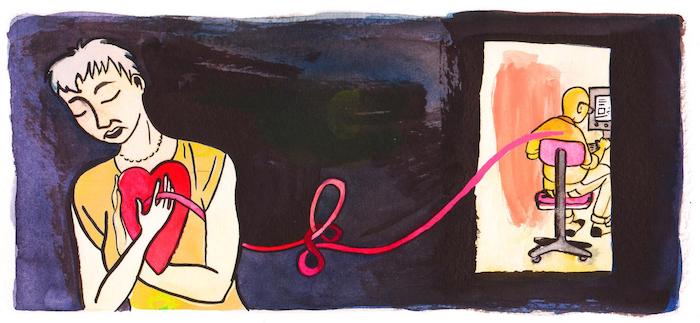Find out now how they want to die.

I’m an ER doctor, and we need to know what matters most to your family member.
By Emily Aaronson
By now, most of us know the basics of getting through the coronavirus crisis: Wash your hands. Stay at home. Stay informed.
But there’s one other task we should all engage in now: Talk with a loved one about what they would need so that they can feel at peace at the end of life. It’s important that you understand what would be most important to them if they were in the last phase of their life — and what steps you and others will have to take to ensure those needs are met. These are conversations about hopes, but also about finances, decision-making and even about their more basic fears. These are conversations designed to guard against regrets.
There isn’t going to be a better time than now, when the periods in our days in which we can offer full, undivided attention are expanding. While social distancing at home, where you can be perfectly positioned on your couches or over FaceTime, with no appointments to run to, reservations to make or kids to pick up, this moment is perfect. Call your mother, or your brother or your daughter.
Of course, all of that is in addition to the other very real reason that having a careful conversation with the ones you love most about what matters most to them is important: In the days ahead, you may need to know the answers.
The most recent worst-case modeling from the Centers for Disease Control and Prevention paints a dire picture, predicting widespread transmission and asserting that most of the U.S. population will be exposed to the virus. Reports from Italy show us what care looks like when we can’t care for everyone, including the obligation to make hard decisions about who should receive the rationed resources. This doesn’t, of course, take into account all of the dramatic measures now in place. But there is no question that as illness spreads, lives will be lost. We hope that the demands on our health-care system won’t outstrip its capacities, but we also have to plan for the possibility that they might. Under those circumstances, getting your loved ones to clarify their wishes will have been an act of heroism.
The alternative is terrifying. As an ER doctor, I am already faced with patients who arrive too sick to tell me their wishes, with no documentation of what those were when they were well enough to articulate them and with family members who never asked and, as a result, just don’t know. It is in these situations, as I place tubes and lines in this failing body, that I worry we are not providing care that is concordant with their goals. If I had known that the 68-year-old with recently diagnosed metastatic breast cancer is more worried about being uncomfortable at the end of her life, rather than prolonging it, we wouldn’t have placed that breathing tube and would instead have focused our intensive efforts on making her comfortable. If I had known that the 81-year-old had always hoped to die at home, I would have spent more time trying to mobilize our home hospice team rather than defaulting to a hospital admission. If I had known that the most important thing to the 44-year-old was spending as many days as possible with his sons, I wouldn’t have subjected his wife to the extensive ER discussion about his goals and would instead have focused on giving her the emotional support she needed to prepare for the lengthy ICU hospitalization.
Ultimately, what we need to know in the hospital is what matters most to your family member. Among other things, how long would they want to receive medical care at the end of life? What concerns them about treatment? What are their preferences about where they would want to be if their time was short?
Before your family member gets here, however, there are other questions you will want to know the answers to, to better prepare yourself and them. What affairs do they need to get in order? Are there any family tensions or disagreements they worry about? How involved do they want to be in decisions about their care? If they couldn’t be, who would they like to make decisions for them?
I recently had this conversation with my own father and found out that he worried more about getting overly aggressive care than he did about not getting enough. He wanted me to be his health-care proxy rather than my mother, given my professional experience, and wants to be actively involved in any decisions about his care. Ultimately, he was clear that he would want to spend his last days at home, if my mom had the support she needed, rather than in a hospital.
These won’t be the answers for everyone. To help navigate the nuances of this conversation, the Conversation Project and Death Over Dinner are two collaborations among health-care professionals, community representatives and faith leaders that have created guides to help you move through these conversations. Regardless of which one you use, it’s important to recognize that it may take more than one discussion to leave you feeling prepared to speak with me, at the hospital, with confidence about what matters most to your loved one.
I wish we didn’t have to make and share these difficult decisions, but I worry that we are in a situation that necessitates it even more than usual. In this time of uncertainty, during which some of us have also been graced with a reprieve from the busyness of our external lives, I would ask that you join us at the front lines and — in support of the work that we all have ahead of us — have a conversation.
Complete Article ↪HERE↩!
